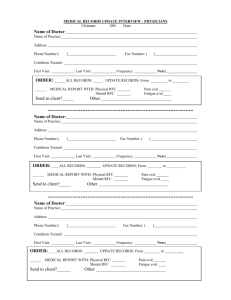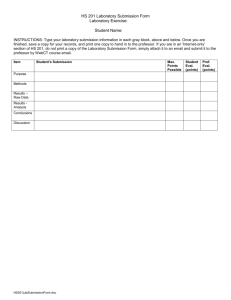What makes a Web Page useful for research?
advertisement
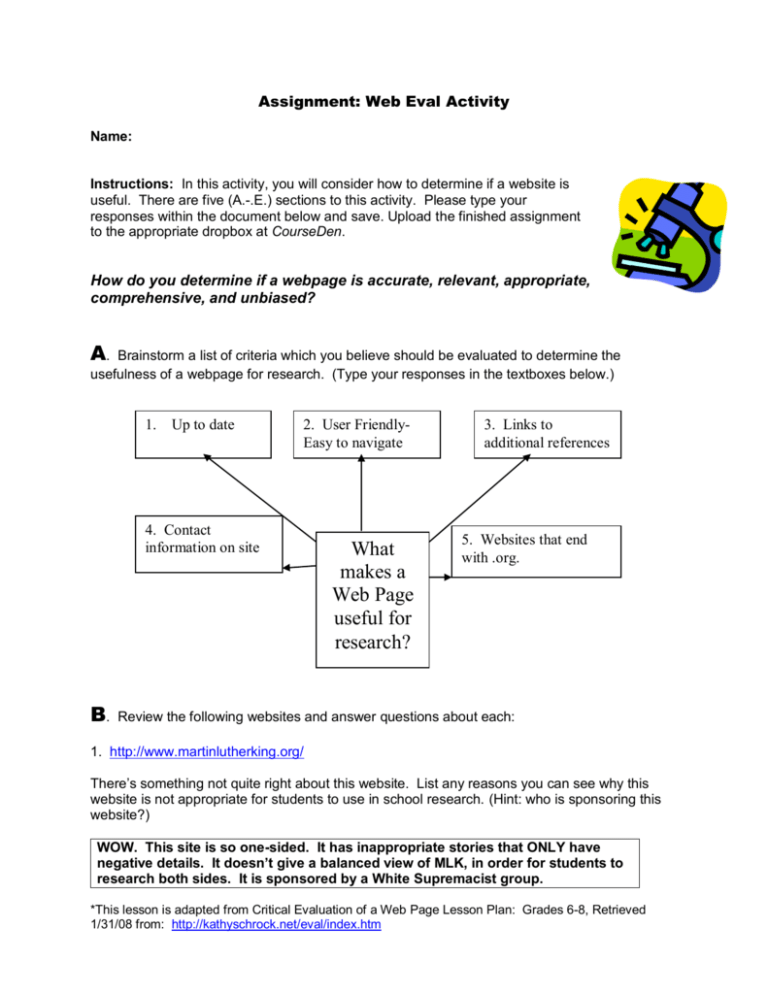
Assignment: Web Eval Activity Name: Instructions: In this activity, you will consider how to determine if a website is useful. There are five (A.-.E.) sections to this activity. Please type your responses within the document below and save. Upload the finished assignment to the appropriate dropbox at CourseDen. How do you determine if a webpage is accurate, relevant, appropriate, comprehensive, and unbiased? A. Brainstorm a list of criteria which you believe should be evaluated to determine the usefulness of a webpage for research. (Type your responses in the textboxes below.) 1. Up to date 2. User FriendlyEasy to navigate 4. Contact information on site B. What makes a Web Page useful for research? 3. Links to additional references 5. Websites that end with .org. Review the following websites and answer questions about each: 1. http://www.martinlutherking.org/ There’s something not quite right about this website. List any reasons you can see why this website is not appropriate for students to use in school research. (Hint: who is sponsoring this website?) WOW. This site is so one-sided. It has inappropriate stories that ONLY have negative details. It doesn’t give a balanced view of MLK, in order for students to research both sides. It is sponsored by a White Supremacist group. *This lesson is adapted from Critical Evaluation of a Web Page Lesson Plan: Grades 6-8, Retrieved 1/31/08 from: http://kathyschrock.net/eval/index.htm 2. http://www.dhmo.org/ I (your instructor) am an ardent supporter of the cause to ban DHMO. Based on the information you find on this webpage, will you join me in supporting this cause? Why or why not? (If you dig deeply enough, you will discover why not.) No, I will not support a ban on “DHMO”. I think I dug deeply enough and found several reasons why this site is unreliable or untrustworthy. At the bottom of the page where the contact information should be is “Note: content veracity not implied”. This means that TRUTHFULLNESS isn’t implied. You should be able to contact and get a response from a creditable site this site states: “Due to the high volume of email we receive, we may not be able to reply to every letter. However, we do read them all.” This too suggests that it is an unreliable site. The site does include links to other sites as references leading you to believe the site is credible, but if you try to search DHMO on those sites you get NOTHING! C. Below you will find six important website evaluation criteria. These criteria are explained with examples at the Good, Bad, and the Ugly website (brought to us by the New Mexico State University Library). Read through this website, then answer the questions that follow about each website. 1. Authority Do you consider the author of Clonaid to be an expert of the subject covered? Why or why not? Yes!! Dr. Brigitte Boisselier would be considered an expert in the field of Cloning. She holds a master's degree in biochemistry, a Ph. D in physical chemistry from the University of Dijon in France and another Ph. D in analytical chemistry from the University of Houston. 2. Accuracy What information in The True…Facts about Women with AIDS leads you to believe or disbelieve its accuracy? The copyright of the website is in 2010. So, that right there makes it inaccurate. The author of the website is named Dr. Juatta Lyon Fueul- “what a lying fool”. So, I do not believe in its accuracy. *This lesson is adapted from Critical Evaluation of a Web Page Lesson Plan: Grades 6-8, Retrieved 1/31/08 from: http://kathyschrock.net/eval/index.htm 3. Objectivity Can you determine the real purpose of The Truth? What is it and how did you determine the purpose? I think the purpose of THE TRUTH is to make BIG TOBACCO look bad. Everything boils down to how bad Big Tobacco companies can be; such as, the videos, the questions, the games, etc….. 4. Currency Is it easy to determine the currency of The Onion? What did you do to determine the currency of the site? The copyright at the bottom of the page is 2009. The article at the top of the webpage is from 11/05/09. Very UP-TO-DATE!!! 5. Coverage Do you consider the information on OncoLink to be relevant and comprehensive? Why or why not? Yes I think it is relevant and comprehensive, because it has current news, latest updates, blogs, doctors pages, etc….like, information on all types of cancer. D. Visit the following pages and briefly share your thoughts (a sentence or two) about how you might guide your future K-12 students in determining the reliability of the information found: http://www.google.com/technology/pigeonrank.html http://zapatopi.net/treeoctopus/ http://www.weathergraphics.com/tim/fisher/ I would definitely tell my students to check the contact information out to see if the “author” or “sponsor” of the website is legitimate. As with the first website, if you scroll to the bottom of the page you see where it was created on “Note: This page was posted for April Fool's Day - 2002.”. At 1st you probably think it is reliable because GOOGLE is a well known and reputable search engine, but always look deeply for a “crack”. The same thing goes for the 2nd website if you look for contact information you see- “This site is not associated with any school or educational organization, other than the Kelvinic University branch of the Wild Haggis Conservation Society.” This negates its potential reliability factor, also. So, I would HIGHLY advice my students to look through the entire site closely, before using it as a factual base for research. “LOOKS CAN BE DECEIVING” *This lesson is adapted from Critical Evaluation of a Web Page Lesson Plan: Grades 6-8, Retrieved 1/31/08 from: http://kathyschrock.net/eval/index.htm E. Write a paragraph explaining why it is important to evaluate the information found on a Web page, include the ways to find out more about the author, the sponsoring agency, or the information itself. Paste this information on your Web Eval wiki page. Why should we evaluate information found on the Web? There's little or no quality control on the Internet Practically anyone can upload a home page or web site onto the WORLD WIDE WEB and because of this the potential for greater irresponsibility is higher than in other avenues of communication (TV, radio, newspaper) There are A LOT of websites where people with unclear qualifications seem to speak with authority on complex topics, about which they may in truth have no real knowledge or expertise. Ways to help evaluate a website for accurate and reliable content: 1) Author: Go to the home page of the website and search for the author’s name and his or her affiliation with the site. Try to find pages about or by the same author by performing a Google search on the author’s name. Finally, if a document lists no obvious author, you must carefully examine the publisher, institution or organization responsible for sponsoring the document's website 2) Sponsoring Agency: You can answer the following questions to determine reliability: Does the site clearly identify the organization responsible for publishing the information found on it? Is there a link at the top or bottom of the page linking back to information about the website’s publisher or sponsor? NOTE: You can often find such info from an "About Us" or "Frequently Asked Questions" link. From examining the website’s URL, can you determine if the page is part of someone’s personal account or part of an official site? NOTE: A tilde (~) in the URL usually indicates a personal web page rather than an institutional website. Can you determine if the information has been published elsewhere, such as in a scholarly journal? Does the document have consistent headers or wallpaper that imply an association with a larger website? THANKS TO: www.Lib.unc.edu 3) Information Itself: You can do a Google search for more information. You can go to more WELL-KNOWN and RELIABLE sites (WEBMD, USgov.org) and search for information on your topic. You can look in periodicals, newspapers, books, magazines to further confirm the subject matter you are researching on the web. *This lesson is adapted from Critical Evaluation of a Web Page Lesson Plan: Grades 6-8, Retrieved 1/31/08 from: http://kathyschrock.net/eval/index.htm *This lesson is adapted from Critical Evaluation of a Web Page Lesson Plan: Grades 6-8, Retrieved 1/31/08 from: http://kathyschrock.net/eval/index.htm
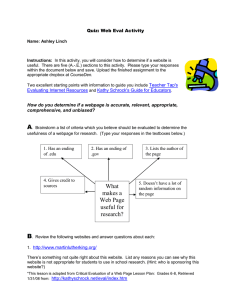
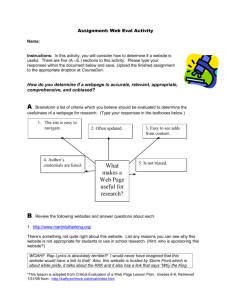
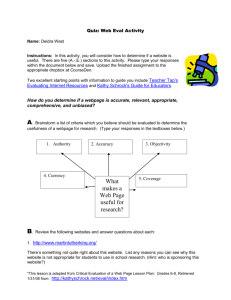
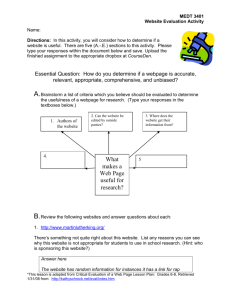
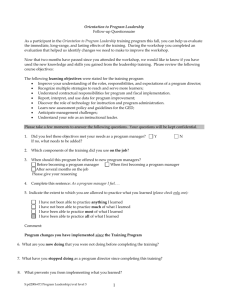
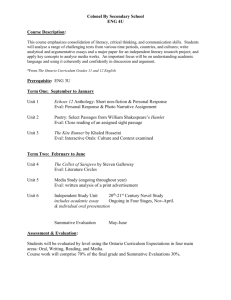
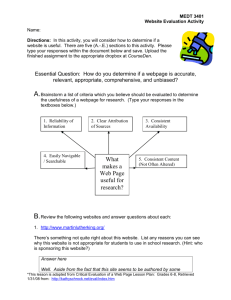
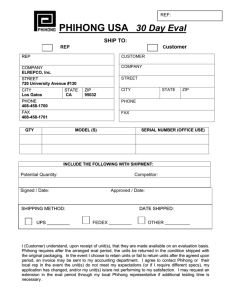
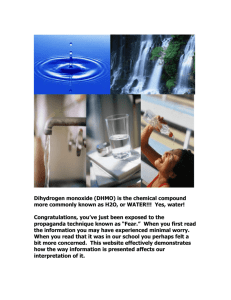
![Please go to the following website [eval.franklin.uga.edu] and fill out](http://s3.studylib.net/store/data/008442817_1-afd5046c9c27af7ab7918658ed8da10d-300x300.png)
